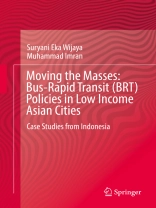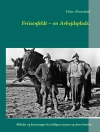Public transport in low-income Asian (LIA) cities fails to meet people’s mobility needs, generates high greenhouse gas (GHG) emissions and worsens social exclusion. Following successful Bus Rapid Transit (BRT) projects in Bogota and Curitibá, LIA countries promoted BRT in their large to medium-sized cities. However, the political and institutional structure distinctive to LIA cities makes their implementation difficult. This book investigates policy tensions by examining the planning and attempted implementation of BRT projects, taking Bandung and Surabaya in Indonesia as case studies. It analyses BRT to understand how power and communication gaps in institutional relationships between different actors at multiple levels of governance create conflict, and concludes that top-down policies and funding mechanisms cause tension in intergovernmental relationships. It also found that BRT solutions generated socio-political tension arising from the socio-economic realitiesand local political dynamics that shaped city structure, mobility patterns and capacity in resolving conflicts. The superimposed BRT solution generated discursive tension because conflicting discourses were not aligned with local economic, social, and environmental issues. The book highlights the need to take into consideration the vital role of local social and political actors, institutions and planning processes as they respond to and shape policies that are imposed by higher levels.
Tabla de materias
List of abbreviations.- Indonesian terms.- Introduction.- Chapter 1 Complexities of urban transport in low-income Asian (LIA) cities.- 1.1 Urban transport and climate change issues.- 1.2 Features and characteristics of medium-sized low-income Asian cities.- 1.2.1 Urbanisation in LIA cities.- 1.2.2 Compact urban forms and travel characteristics.- 1.2.3 Transport and environmental characteristics in LIA cities.- 1.2.4 Solutions offered to urban transport problems in LIA cities.- 1.3 Governance and multi-level governance.- 1.3.1 Governance.- 1.3.2 Multi-level governance.- 1.4 The challenges of multi-level governance for LIA cities.- 1.5 Multi-level planning policy issues and responses in Indonesia.- 1.5.1 System for the development of planning and policies.- 1.5.2 Spatial and sectoral planning.- 1.5.3 Urban transport projects.- 1.6 Summary.- Chapter 2 Conceptualising policy tensions in LIA cities.- 2.1 Power, communication, and participation.- 2.1.1 Power in multi-level governance structure.- 2.1.2 Legitimacy, communication, and participation.- 2.2 Multi-level governance in Europe and LIA.- 2.2.1 Multi-level governance in the EU.- 2.2.2 Multi-level governance in the Low-Income Asia.- 2.2.3 Comparison of multi-level governance in Europe and LIA cities.- 2.3 Theoretical framework.- 2.4 Research design.- 2.4.1 Data collection methods.- Chapter 3 Transport planning and policies in Indonesia.- 3.1 Transport and climate change decision-making in Indonesia.- 3.1.1 Government organisations.- 3.1.2 International organisations.- 3.1.3 Non-government organisations.- 3.2 Transport and climate change policies in Indonesia.- 3.2.1 Environment and climate change policy.- 3.2.2 National development planning system.- 3.2.3 Transport policy.- 3.2.4 Spatial planning policy.- 3.2.5 Energy policy.- 3.2.6 Economic policies.- 3.3 Summary.- Chapter 4 Transport planning and policies in Bandung.- 4.1 Personal experience of commuting in Bandung.- 4.2 Bandung urban transport challenges and emerging opportunities.- 4.2.1 Economic growth, urbanization, and urban form.- 4.2.2 Increasing road construction and motorization.- 4.2.3 Air pollution problems.- 4.2.4 Declining public transport patronage.- 4.3 Transport decision-making in Bandung.- 4.3.1 Stakeholders in the decision-making.- 4.3.1.1 International development agencies.- 4.3.1.2 Central government organisations.- 4.3.1.3 Provincial government organisations.- 4.3.1.4 City government organisation.- 4.3.1.5 Public transport operators.- 4.3.1.6 Non-government organisations.- 4.3.2 BRT decision-making in Bandung.- 4.4 Bandung transport policy review.- 4.4.1 Urban spatial planning policy.- 4.4.2 Urban development planning policy.- 4.4.3 Climate change policy.- 4.4.4 Urban transport policy.- 4.4.5 Bandung BRT studies.- 4.5 Policy tensions in the BRT project.- 4.5.1 Institutional-financial power of higher level governments.- 4.5.2 Socio-political power.- 4.5.3 Discourse in advancing BRT in Bandung.- 4.5.4 Communication and participation gaps.- 4.6 Summary.- Chapter 5 Transport planning and policies in Surabaya.- 5.1 Personal experience of communicating in Surabaya.- 5.2 Surabaya urban transport challenges and opportunities.- 5.2.1 Economic role of Surabaya.- 5.2.2 Urban form and transport system.- 5.2.3 Transport externalities.- 5.2.4 Urban public transport system.- 5.3 Transport decision-making process.- 5.3.1 Stakeholders in the decision-making.- 5.3.1.1 International development agencies.- 5.3.1.2 Central government organisations.- 5.3.1.3 Provincial government organisations.- 5.3.1.4 City government organisations.- 5.3.1.5 Public transport operators.- 5.3.1.6 Non-government organisations.- 5.3.2 BRT decision-making in Surabaya.- 5.4 Surabaya transport policy review.- 5.4.1 Urban spatial planning policy.- 5.4.2 Urban development planning policy.- 5.4.3 Climate change policy.- 5.4.4 Infrastructure development policy.- 5.4.5 Urban transport policy.- 5.4.6 Surabaya BRT studies.- 5.5 Policy tensions in urbantransport in Surabaya.- 5.5.1 Institutional and financial power at different levels.- 5.5.2 Socio-political power in Surabaya.- 5.5.3 Discursive power in the selection and rejection of the BRT in Surabaya.- 5.5.3.1 Low-cost storyline.- 5.5.3.2 Modern and practical storylines.- 5.5.3.3 Environmentally sustainable storyline.- 5.5.4 Community participation and consultation gaps.- 5.6 Summary.- Chapter 6 Identifying policy tensions in transport planning and policies.- 6.1 Explaining the dynamics of transport and climate change policies.- 6.2 Explaining policy tensions in BRT projects in Bandung and Surabaya.- 6.2.1 Financial-institutional tensions.- 6.2.2 Socio-political tensions.- 6.2.3 Discursive tensions.- 6.2.4 Communication and public participation tensions.- 6.3 The importance of multi-level governance framework.- Chapter 7 Conclusion.- 7.1 Directions for future research.- References.- Appendices.
Sobre el autor
Suryani Eka Wijaya is a Planner at the Regional Development Planning Agency (BAPPEDA), Nusa Tenggara Barat (NTB) Province in Indonesia, where she has led spatial planning and natural resources sub-divisions, prepared development plans for regional growth and coordinated development programmes at the central government, provincial government, and city/district government levels. Her research focuses on the challenges and opportunities that Bus Rapid Transit brings to low-income Asian cities. Suryani received her Ph D in Planning from Massey University (as a New Zealand Development Scholar), her Master in Engineering Management and Policy from the University of Technology, Sydney (on the Australian Development Scholarships) and her undergraduate degree in Civil Engineering from Gadjah Mada University, Indonesia.Muhammad Imran is an Associate Professor and Programme Coordinator Resource and Environmental Planning at Massey University, New Zealand. His research focuses on generatingtheoretical and practical knowledge that contributes to sustainable transport policies in developed and developing Asian countries. His research has generated an in-depth understanding of institutional blockages to, and opportunities in, sustainable transport by arguing for greater recognition of the role of governance, history-politics nexus, and discourse on transport decision-making. Imran is the author of a book, Institutional barriers to sustainable urban transport in Pakistan published by Oxford University Press. Imran has received research grants from the Royal Society of NZ Marsden Fund, the NZ Transport Agency and has acted as a consultant for the World Bank.












